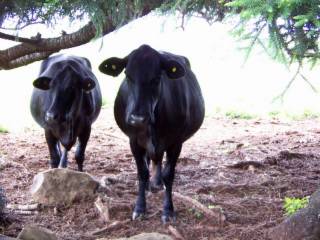Eating the neighbours
Living on a farm, you can’t get away from death. I know it’s eventually coming for all of us (let me just put a dampener on your day, eh?) but that’s not what I mean. On this farm, there are cows, calves and a bull, and all of them will one day be dispatched to their deaths by humans. (Unless they die of natural causes beforehand, which - though painful - might be preferable). And in case you don’t know it, cattle do have families, friends and feelings. When a cow’s calf is sent away on a truck to the sales or the abattoir, that cow will stand where she last saw the calf, calling it. For three or four days. And it’s not a nice cartoon-cow noise: it’s a loud and rumbling bellow. Airy-fairy types such as myself think she is grieving, but others would say her udder is over-full and she’s telling the calf it’s time for a feed.
Either explanation means distress for her, though, and that’s the point. The production of meat & leather & dairy products (cows produce milk for their calves; you must remove the calf if you want to collect the milk) means a high price for cattle, and I don’t mean dollars. Though that is exactly the point from a farmer’s point of view, and a big buyer from Queensland (bless his socks) made farmers such as my father very happy recently, pushing the local price for vealers up to AUD$2.68 a kilo liveweight. (If you’re a farmer, that’ll impress you, apparently.)
If the picture I’m painting here reflects badly on farmers (including my parents), that would be a skewed view. Mum and Dad aren’t hideous people: they’re kind. They love the cattle. They don’t want to hurt them, and if they allowed themselves the indulgent soppiness that I wallow in, they’d go broke, whole industries would collapse, and eventually there’d be no more domestic livestock.
I don’t like the idea I might be eating someone I once knew, so I used to be vegetarian. But now I believe that life (your life, mine) feeds on death, and can’t do otherwise. It happens everywhere: animals killing and eating other animals, fresh growth rising from decaying plant matter, new technologies ransacking the old for parts. It’s a deep and ancient sorrow that we moderns don’t need to face - that we can’t live without killing - but hunters were always aware of it, and thanked the spirits of their prey for giving them life. Want to try it?

The meaning of meat.
Either explanation means distress for her, though, and that’s the point. The production of meat & leather & dairy products (cows produce milk for their calves; you must remove the calf if you want to collect the milk) means a high price for cattle, and I don’t mean dollars. Though that is exactly the point from a farmer’s point of view, and a big buyer from Queensland (bless his socks) made farmers such as my father very happy recently, pushing the local price for vealers up to AUD$2.68 a kilo liveweight. (If you’re a farmer, that’ll impress you, apparently.)
If the picture I’m painting here reflects badly on farmers (including my parents), that would be a skewed view. Mum and Dad aren’t hideous people: they’re kind. They love the cattle. They don’t want to hurt them, and if they allowed themselves the indulgent soppiness that I wallow in, they’d go broke, whole industries would collapse, and eventually there’d be no more domestic livestock.
I don’t like the idea I might be eating someone I once knew, so I used to be vegetarian. But now I believe that life (your life, mine) feeds on death, and can’t do otherwise. It happens everywhere: animals killing and eating other animals, fresh growth rising from decaying plant matter, new technologies ransacking the old for parts. It’s a deep and ancient sorrow that we moderns don’t need to face - that we can’t live without killing - but hunters were always aware of it, and thanked the spirits of their prey for giving them life. Want to try it?

The meaning of meat.

<< Home